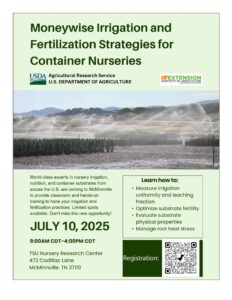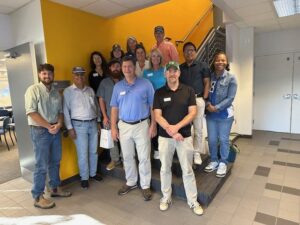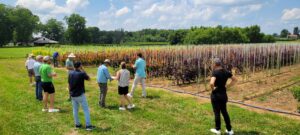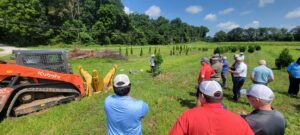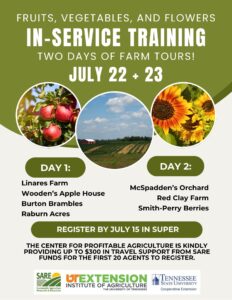Final report for STN23-001
Project Information
The University of Tennessee looks to continue the sustainable agriculture training the SARE program offers to Extension agents,
specialists and other agriculture professionals. In meeting those training needs we gather input from regional agriculture program leaders, Extension agents, program partners, producers, and state co-coordinators. The program assistant will promote awareness of the SARE program, along with a secondary focus on the SARE grant programs, encouraging utilization and promotion of this program. The state co-coordinators working with the
program assistant will seek to provide opportunities for more in-depth training related to sustainable agriculture. This will help to develop training with a more direct program focus. All training opportunities provided will be in-line with the mission of SARE:
- Profitability for the farm
- Care of the water/land resources
- Improving the quality of life
- Focus on Production
We will also work with agriculture professionals that find other training opportunities to participate in as long as these trainings relate to the mission of the SARE program. These will be treated on a case-by-case basis and the determination of these trainings in meeting the mission of SARE will be determined by the state co-coordinators and the program assistant. All trainees will be required to report on their training opportunities so program impact can be determined and reported. Impacts will be provided in the annual SARE report and the proper Extension reporting areas. Department information sheets will be developed on major program impacts/research.
- Train up to 30 Extension Agents on “The Basics of Sustainable Agriculture Production.” This program will be led by Dr. Annette Wszelaki, a member of our advisory committee and Professor in Plant Sciences with a specialization in vegetable production. Her program outreach is in vegetable production, season extension, organic and sustainable crop production and produce safety. She will be assisted in this training by Rachel Painter, Value-Added Marketing Specialist with the Center for Profitable Agriculture and Troy Dugger, SARE Program Assistant and Program Coordinator for the Center for Profitable Agriculture. This training will take place in the central part of our state and will be designed as a two-day event. Classroom training will take place for 75% of the first day on sustainable vegetable production practices, with a section of cover crops. The other 25% of the first day and the majority of the second day will be touring farms in the area that show these production practices (up to four farm locations will be featured.)
- Train-the-Trainer with the “Sustainable Agriculture In-Service” Training for Extension Agents. This two-day training will be coordinated and led by Rachel Painter and Troy Dugger with the Center for Profitable Agriculture. Day one will consist of classroom instructions before touring small enterprise and acreage farms. These farms could include specialty crops important to Tennessee to include marketing and sustainable production practices. The second day of the training would allow Extension Agents to participate in day one of the Pick Tennessee Conference, focusing on presentations related to sustainable agriculture. The Pick Tennessee Conference “provides educational programming and networking in a collaborative environment which fosters growth to sustain agriculture.” This training will be provided for up to 30 Extension Agents.
- Sustainable Agriculture Trainings for Agriculture Professionals will provide an opportunity for six agriculture professionals to attend sustainable agriculture trainings. These trainings could be identified by SARE personnel or by the agriculture professional wishing to attend an event that fits the mission of SARE. Travel expenses will be covered for those attending and a report provided to SARE on what was learned and how the trainer can use that information in an educational setting.
- SARE Promotion of Agriculture Planning Days, Professional Development Association Meetings, and other events to promote the TN SARE Program – Opportunities to promote, educate and offer ideas about the SARE program in TN are valuable to expand the program. These planning days and events will be used to accomplish these goals. Reports on previous sustainable agriculture programs conducted, giving Extension Agents the opportunity to speak about their sustainable agriculture opportunities, and our SARE display at these meetings and events will be helpful in promotion of SARE. Included in this budget is travel expense for the Program Assistant to attend these events.
Advisors
- (Educator)
- (Educator)
- (Educator)
- (Educator)
- (Educator)
- (Educator)
- (Educator)
- (Educator)
- (Educator)
Education
The primary audience for the professional development educational trainings will be County Extension Agents, Subject Matter Specialists, and other professional agriculture professionals in Tennessee. This group of trainees is well-positioned to transfer information learned about sustainable agriculture practices to farmers and landowners in local communities. The Professional Development Program (PDP) is based upon the traditional method of "Train the Trainer," which has proven to be an effective model with the SARE Program.
Education & Outreach Initiatives
Educate Extension Agents in Tennessee and Georgia on sustainable lawn, garden and landscape practices for homeowners and those with urban agriculture interest.
Lawn, garden, and landscaping questions are some of the highest volume areas in our entire Extension system. And, there are so many opportunities to serve new and existing audiences through horticulture training. This-in-service is designed to provide training in foundational concepts in ornamental landscape and vegetable garden site and crop selection and management and help agents address the most common questions that come into the county office.
The University of Tennessee and the University of Georgia Agriculture Update was held on June 6, 7, 2024, in Chattanooga, TN, in partnership with the UGA Center for Urban Agriculture and the UT Horticulture Team. This collaborative training allowed 36 Extension agents and specialists from Tennessee and Georgia to exchange resources and expertise among peers.
With a focus on urban needs, this program included an “urban ag discussion panel” featuring Dr. Natalie Bumgarner and Extension Agents Amy Dunlap and Haley Treadway, all of Tennessee. A riverfront urban tour was later led by Extension Agent, Lee Rumble, followed by a visit to Crabtree Farms of Chattanooga. Crabtree Farms’ mission is to expand access to locally grown food, provide farm based educational opportunities, and cultivate community.
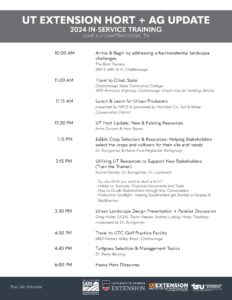
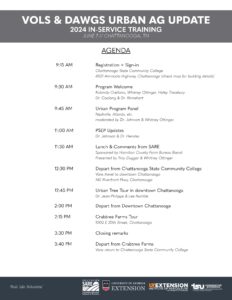
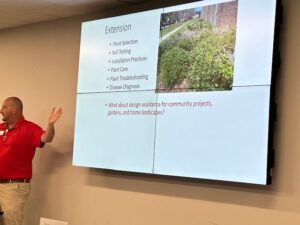
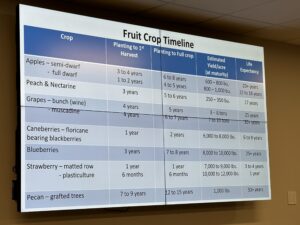
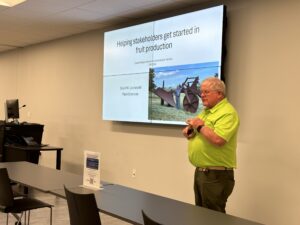
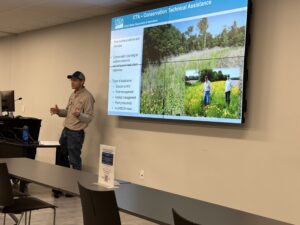
STATEMENTS FROM PARTICIPANTS:
- The knowledge gained will enhance my clients' landscape recommendations and turf grass selection recommendations. Furthermore, I have learned strategies to serve clients in non-traditional agricultural settings better and strategies to engage with them to strengthen agricultural literacy, apply practical agriculture principles to urban environments, and reach potentially underserved audiences more effectively.
- I loved attending an urban specific training! It was a great opportunity to network and collaborate with other agents working in similar areas. I especially liked hearing from UGA extension agents on how they operate in Georgia to see what practices could be applied in Tennessee. The presentation from NRCS was helpful in understanding what funding opportunities are available to landowners and small-scale producers.
- I learned so much about tree disease ID, urban tree management, and urban tree ID from the urban tree tour led by Lee Rumble. This will be incredibly helpful information for use in Sumner County as we are receiving a large urban forestry grant, $120,000 of it is allotted to urban tree planting and management over three years. Also, the collaboration with other agents, specifically, ways to engage local farmers market producers in extension programming; ideas were shared on both sides that will be beneficial going forward.
- Our two-day event hosted numerous “out-of-the-norm” topics as well, particularly the presentation on landscape design, sustainability, and urban agriculture components for long-tern success—utilizing native plants, conserving water, the discussion panel, and the use of low-impact materials all help to benefit our landscapes and world as a whole. I really enjoyed the farm visit out at Crabtree Farms and found great similarities to that of a local non-profit that I work with here in Knoxville that is also working in a similar vein (for the benefit of our underserved audiences).
Use the 2025 Pick TN Conference and the Sustainable Agriculture Training as professional development tools for Extension Agents to learn about sustainable agriculture practices and interact with the various organizations/associations who conduct the Pick TN Conference to gather ideas/information to use in their county educational programs.
The Sustainable Agriculture Training is conducted via a classroom setting and farm tours. The classroom setting allows for discussion from Extension Agents to the speaker on sustainable agriculture practices. The farm tours allow agents to see what producers are doing and learn from the farmers. Many of the tours have allowed agents to see what can be done on small acreage, which is the type of question they receive in each of their counties – “what can I do with just a few acres?”
Eight Extension Agents, one Extension specialist and one program coordinator, attended the 2025 Pick TN Conference with expenses covered by our state SARE program funds. The mission of the Pick TN Conference is to provide educational programming and networking in a collaborative environment that fosters growth and sustains agriculture. This work is done with support from the TN Department of Agriculture, UT Extension, UT Center for Profitable Agriculture and nine state associations and coalitions, with annual attendance of 700 conference participants.
2025+Pick+TN+Conference+Schedule.pdf
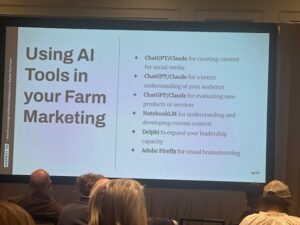
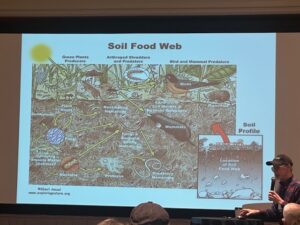
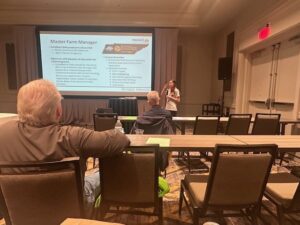
STATEMENTS FROM PARTICIPANTS:
- Went to two different sessions on growing herbs. Will share knowledge gained with home horticulture clientele and master gardener volunteers.
- Went to a session on growing chestnuts. This was a new topic area for me and I learned a lot. Will be great to share that with clientele especially species recommendations.
- Growing dahlias was also a new topic area for me. Several sessions on marketing at farmers markets and use of social media to market farm value added products. Lots of personal knowledge gained and I will share that with local farmers market vendors and farmers market manager.
- Upon attending the Pick TN conference for the first time, I had very little knowledge of the “ins and outs” of specialty crops – specifically cut flower crops. ?” I chose to attend most of the cut flower lectures because of this, and I was pleased to find out that many of them were tailored to beginner-level audiences. A broad range of topics were covered such as marketing and social media usage, business management and budgeting for beginner farmers, methods for greenhouse and field grown operations, soil health, growing specific profitable flowers, and more. It would be impossible to list all of the wonderful tidbits of knowledge that I learned in these sessions, but I feel very confident in my understanding and knowledge of cut flower crops and operations post-conference. I feel prepared to assist homeowners with cut flower questions moving forward, as well.
- The Pick TN Conference has given me a wealth of information that I will be able to bring back to my county clientele and implement into my county programming. The Tennessee Department of Agriculture has a Farmers Market grant to assist with promotion and marketing of our local markets. Since we have three farmers markets in the county, I feel that this will be incredibly beneficial for our local communities. Kerry Brown presented on frugal homesteading and it gave me a different perspective on low-cost homesteading. I have had several people in the county contact our office who are interested in starting their own homestead, so I will be able to use the information that I learned from Mr. Brown during my farm visits with my clientele.
- Attending the 2025 Pick TN Conference gave me some good takeaways that I can use in our county programs, especially when it comes to homesteading and beekeeping. The Frugal Homesteading session gave me some practical information on low-cost or free ways to make the most of land and resources, from water collection and material sourcing to advice on setting up a solar array to take your homestead off-grid and lower your power bill. I also learned about resources and support available to beekeepers in Tennessee, including educational programs like the Tennessee Master Beekeeping Program, current on-going research at UT, and state initiatives to help beekeepers succeed. These are valuable insights that I look forward to sharing with our local farmers and homesteaders to help them build more sustainable and/or profitable operations.
SUSTAINABLE AGRICULTURE TRAINING
Thirteen Extension Personnel participated in the 2025 Sustainable Agriculture Training which included a classroom setting, farm visit and one day at the Pick TN Conference. The classroom setting had educational presentations from a local honey producer and his successful business upstart locally and a presentation on cut flowers, which is becoming a big business on many farms in Tennessee. The local farm visit was to a cut flower farm to learn from them, hear about how they started, their production techniques and the key to their success. An additional/optional visit was also to a local bulk food store that sells many local products.
COMMENTS FROM PARTICIPANTS:
- Being able to visit small farms and see what they can do with a small area/acreage, helps us as Extension agents to know what to talk with other new farmers about that have this question - what can I do with a few acres.
-
At the Sustainable Agriculture Training on February 12, 2025, Nathan Coleman, owner of Duck River Honey, shared his inspiring story of building a successful honey business. His story highlighted the growth of his bee colonies over the years, which has increased the number of pollinators in his area that play a crucial role in producing various crops, flowers, and trees – a valuable link in sustainable agriculture. The information Nathan provided was both encouraging and practical, offering valuable insights for me to share with individuals in my county who are interested in starting their own apiaries. By modeling his steps, aspiring beekeepers can effectively raise bee colonies and harvest honey, turning it into a profitable value-added product.
2025 Sustainable Agriculture Training Agenda
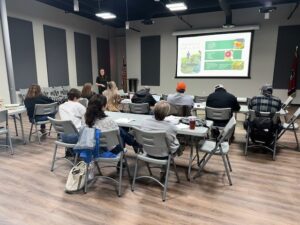
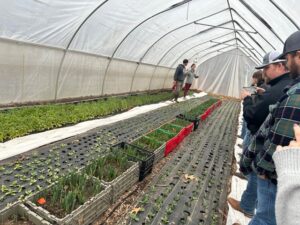
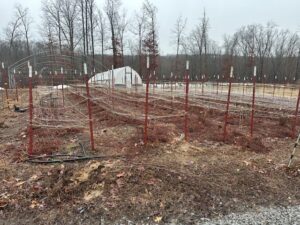
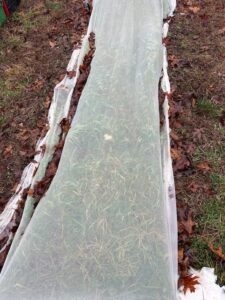
Extension Personnel learn the latest information relating to the production of fruits and vegetables in the Southeast.
- SARE funding provided the opportunity for one Extension Specialist and one Extension Agent to attend the 2025 Southeast Regional Fruit and Vegetable Conference.
- The University of Tennessee Horticulture Fruit & Vegetable Team attended multiple sessions at this conference to increase educational awareness to support producer initiatives and agent in-service training topics at the state level in Tennessee.
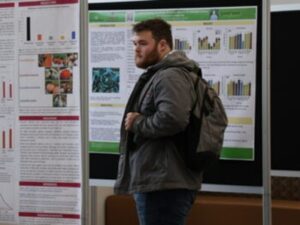
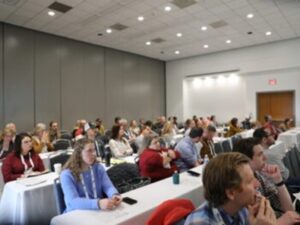
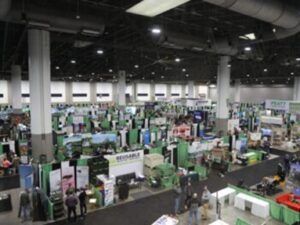
Each of the above add to the educational opportunities available to conference participants.
https://seregionalconference.org/2025/02/2025-conference-guide/#flipbook-df_3849/3/ Conference Guide/Agenda
Participants comments:
- Participation in the 2025 Southeast Regional Fruit and Vegetable Conference in Savannah, Georgia on January 10 and 11 was worthwhile, educational and provided valuable professional development. With hundreds of exhibitors, the conference trade show alone would have been worth the registration fee – the trade show provided a ‘one-stop shop’ for the latest in production, harvest, post-harvest and packaging technology, discussion and conversation. The educational sessions provided both broad discussions on concepts, marketing experiences and on-farm applications as well as specific trials, research and results. Specific areas of knowledge that provided key take-away applications for me included: farmland preservation tactics, direct marketing techniques, organic production, agroforestry, alternative crop marketing, federal policy issues, farm labor, specialty crop policy and farmland transition and conservation. I will use the information learned at the conference in my Extension outreach as well as in my involvement with the Tennessee Agriculture and Forestry Leadership program and other collaborations. It was an excellent conference which provided useful professional development.
- This program provided a robust opportunity for agents to strengthen knowledge on a wide range of commercial horticultural knowledge, but fruit pathology was a special focus. From controlled environment agriculture to cultivar breeding, I would recommend this conference to any agent new or experienced as there is so much to offer. I will definitely be using the fruit diagnosis and prognosis information learned to better leverage my ability to educate clientele locally.
Advancing values of sustainability, collaboration, and innovation within the sustainable agriculture community.
A Regional Small Farms, Big Community Conference – Southern SARE Funding allowed for five Extension personnel to attend the inaugural SOWTH Conference in Atlanta, GA, in February of 2025. The SOWTH Conference was designed to replace the educational opportunity provided by SSAWG; which hosted its last conference in 2019. Farm tours, educational sessions and opportunities were provided for producers, Extension personnel, industry representatives and others to learn more about sustainable agriculture production.
Five Extension Personnel from Tennessee attended this conference.
Participants comments:
- Participation in the 2025 SOWTH Conference in Atlanta, Georgia on February 5-6 was worthwhile, educational and provided valuable professional development. The trade show area provided valuable networking opportunities as did the hallway between sessions and the meal functions. The eight educational sessions that I attended provided excellent perspectives from diverse growers and unique enterprises. There was great value gained from the experiences, concepts, marketing approaches and on-farm applications they shared. The sessions on direct marketing beef; sustainable carrot production and marketing; raising and marketing layers, meat birds and breeding stock; product cost analysis; and on-farm processing were particularly beneficial. It was an excellent conference which provided useful professional development.
- The SOWTH Conference proved to be a well-planned educational and professional development conference for Extension and all groups represented. Information was gained from my attendance at the following: Procurement – What a Wholesale Buyer Wants; Farmer Advocacy – Farmers and Food Activists to Fighters for a Better Farm Bill; Capacity-Building – Scaling Up: Farmers Share Essential Tools, Equipment, and Experiences; Preserving Farmland for the Future – Successful Methods to Move Farmland to the Next Generation; Pathways Out of the Farmers Market; Agribusinesses, Organization and Cooperatives Making a Difference in Southern Region. This information will help me in my Extension work and allowed me to view some subjects from a different view with new information being presented.
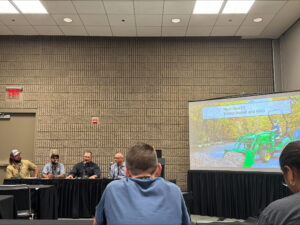
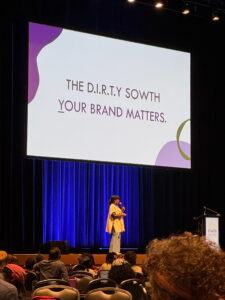
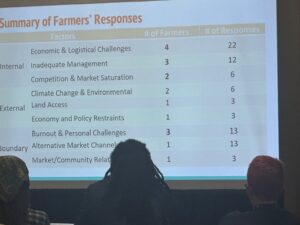
To teach participants about cost-effective methods of using fertilization and irrigation strategies for container nurseries.
Experts in nursery irrigation, nutrition and container substrates provided classroom instruction and hands-on training in order that attendees may learn more about irrigation and fertilization practices.
One area nursery specialist in East Tennessee attended this training. The entire workshop focused on improving efficiency through grouping plants with similar needs into zones, organizing containers by size and improving irrigation uniformity by checking system design and using catch cans to measure water distribution. Fertilization strategies involve monitoring pH and nutrient levels, using low-phosphorous fertilizers when appropriate based on research, and managing irrigation to prevent nutrient deficiencies caused by high-alkalinity water.
The objectives of the Tennessee SARE Committee is to:
• Serve as an on-going focus group to help identify needs, trends and solutions for Extension outreach in the Sustainable Agriculture program space
• Serve as an advisory team for the Tennessee SARE State Coordinators and Program Assistant in the identification of program priorities
• Serve as the primary planning team for an annual or biennial ‘sustainable agriculture educational training tour’ for Extension Agents, Industry Partners and other leaders in a training role
The Tennessee SARE Committee met in Knoxville, TN in September 2025, to develop each of the objectives as described above. The committee also toured a local community garden, a local community farm and attended the Horts, Hops and Crops field day conducted at the East Tennessee Research and Education Center.
Nine of the ten advisory committee members attended along with the Tennessee SARE State Co-coordinators and the program assistants. The committee members learned about the start-up of a community garden and farm, the issues they are confronted with, such as labor and zoning regulations (both of these locations are within city limits), and learned their distribution process for the food produced.
The committee spend time together to discuss sustainable agriculture, SARE Grants in Tennessee, Sustainable Agriculture trainings conducted for agriculture professionals, the monthly SARE newsletter for Tennessee, SOWTH, program ideas for future SARE Model State Programs and how committee members could be more involved in the promotion of SARE and its events/activities across the state.
A more complete report of this meeting will be presented in the final report of fund # SUB00003646. Approximately one-third of the expenses for the advisory committee meeting was provided by SUB00003232; and the remaining two-thirds was expensed through SUB00003646.
Extension agents will learn more about the sustainability of the production system of horticulture plants in Middle Tennessee.
Extension agents will receive a general overview of the Nursery industry and its many segments as they tour five nurseries around Franklin County in southeast Tennessee
A total of fourteen Extension Agents participated in the tour, with five of these agents receiving SARE funding for their participation. The agents toured five nurseries in Franklin County that included Schaffer Nursery, Beans Creek Nursery, Jackson’s Nursery, Tennessee Valley Nursery and Hidden Hollow Nursery. Agents received a general overview of the nursery industry, its various segments, and how each segment plays a role in local, state and national agriculture. Attendees learned more about different plant production techniques, equipment and resource-efficient practices such as basic and advanced irrigation systems, precision fertilization and weed control, as well as energy conservation methods that optimize inputs and results while minimizing waste.
Thirty-six percent of attendees completed the evaluation form. Agents rated their level of knowledge on this subject prior to the tour as 1.8 (scale,1 = lowest knowledge level and 5 = highest knowledge level). After the tour agents rated their knowledge as 3.8. Asked how likely are they to adopt what they learned today, the rating was 3.0 and their rating of the presentations on the tour was 3.8.
Comments included:
Continue to have these. They are great and not too elaborate. I love the field application portion.
Maybe have different topics at each stop not just the same thing with nursery specific methods.
More information on more of the business and marketing side of things. Overall great tour!
Diversity of growing type or condition would have been nice to see and learn about.
Not sure. It was great!
This in-service is designed to support agents in meeting the needs of current and prospective fruit, vegetable and cut flower growers in Tennessee.
The training will be for two days and will focus on in-field tours and interactive teaching to practically equip agents. It is being co-led by specialists with responsibilities in commercial fruit and vegetable production and pathology as well as consumer fruit and vegetables and cut flowers. This integration of commercial and consumer training is designed to support an understanding of the similarities and differences in these audiences and the resources and information to best address needs.
Fifteen agents attended this training; ten agents accepted SARE travel funds for this event. The agents attending this training were 80% horticulture focused, and 20% were crops or beef focused. Sixty percent of the agents had 3 – 5 years of experience while 20% had 6 – 10 years' experience and another 20% had 10 or more years' experience.
The agents were surveyed in the following areas to determine information gained in:
- Vegetable production – 100% moderately useful to extremely useful
- Cut Flower production – 100% moderately useful to extremely useful
- Small Fruit production – 100% very useful to extremely useful
- Agritourism/marketing - 100% very useful to extremely useful
- Tree fruit production – 80% very useful to extremely useful
The agents were asked, “How many stakeholders do you anticipate information or resources from this in-service will assist you in supporting this year?” The average response was 26.
Educational & Outreach Activities
Participation summary:
Learning Outcomes
Project Outcomes
Our plans are to survey Extension personnel who have participated in these SARE programs to obtain information as to exactly how and to what extent the information was used. How did they distribute information and what was the result of these efforts - this will give us a better feel as to progress made with these efforts.
Planning a more in-depth sustainable agriculture training for Extension agents in each region of Tennessee.
Face of SARE
The SARE program is a great benefit to agents, specialists and agriculture professionals in Tennessee as it provides them a means to increase their knowledge of sustainable agriculture. This is done by allowing a number of travel scholarships to agents/specialists/ag professionals, where they can learn first-hand by attending conferences, workshops and farm tours covering a wide array of learning opportunities. The need is to branch out more to other agriculture professionals other than Extension to promote teaching, training and application of sustainable agriculture practices to producers. The promotion of the SARE program in Tennessee has this year and will continue to be done in the following ways:
- Agent In-Service Trainings
- Annual Regional/State Agents Professional Association Meetings
- Personal and Group Emails
- Individual Visits with Agents/Specialists
- Farm Visits
- State Website (to be updated)
- Promotional Banners and Exhibits at Trade-Shows, Agent In-Services and Planning Meetings
- Efforts are made to exhibit a seamless SARE program that includes Extension Personnel from the University of Tennessee and Tennessee State University and to continue these close working relationships.
